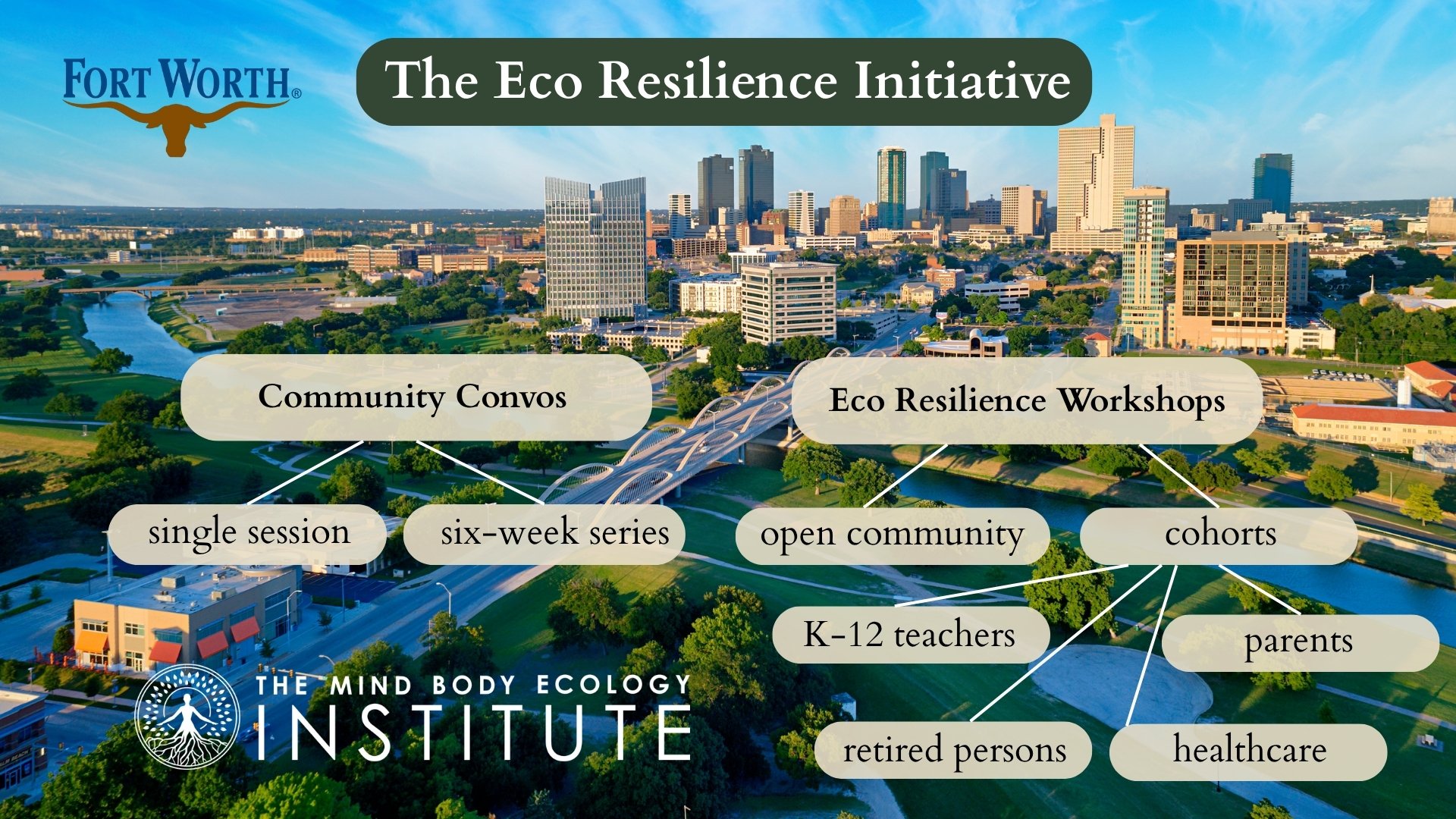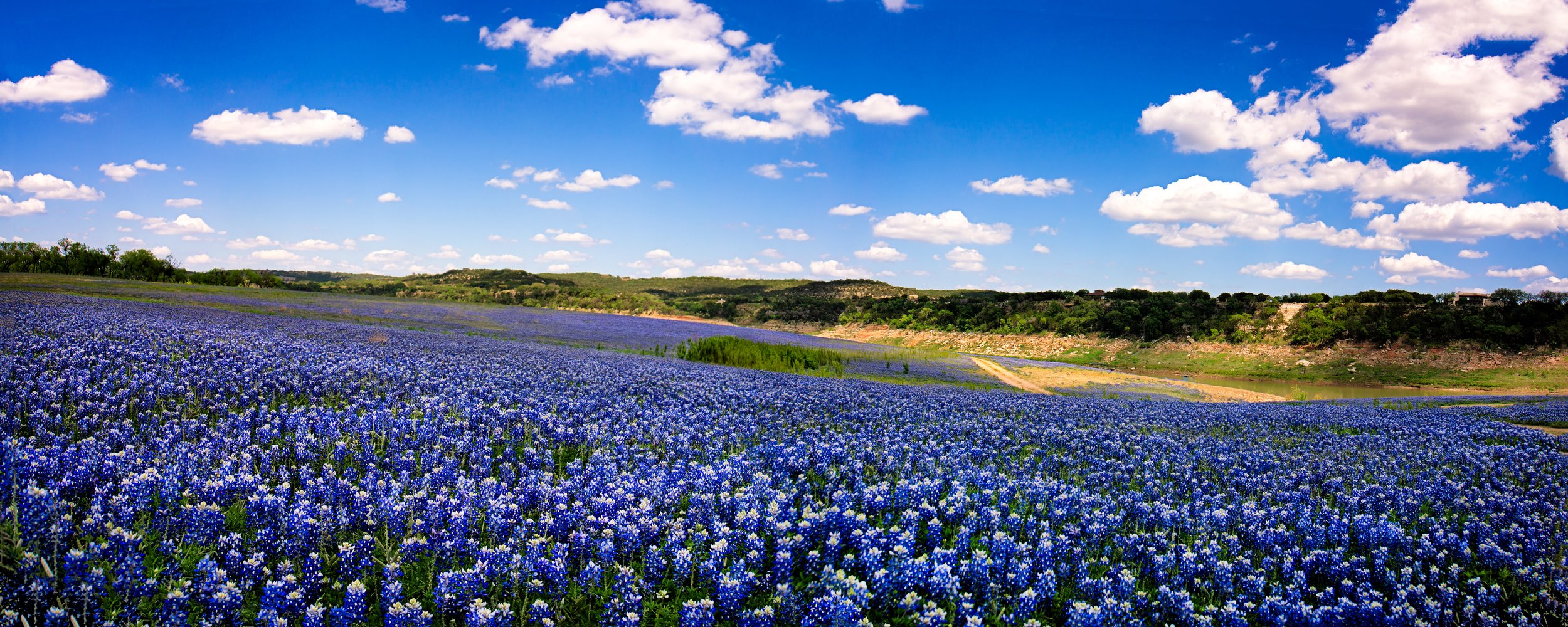
The Eco Resilience Initiative
An eco wellness initiative for personal development and resilient living in Fort Worth, Texas.
The Eco Resilience Initiative programs are dedicated to offering nature-based resilience practices that research indicates can promote health and wellness, strengthen community ties, and encourage appreciation and care for the natural environment.
Eco Resilience Workshops offer knowledge and resilience training for members of the Fort Worth community. The Community Convos series offers small-group nature walks along the Trinity Trails and at the city’s many parks.
The Eco Resilience Workshops support people who help others:
Parents
Heathcare professionals
Retired individuals
Non-profit and public sector workers such as veterans, civic government officials and employees, police and firefighters.
All Eco Resilience programs improve mental health and well-being, invite healthy outdoor activities, deepen appreciation for the Fort Worth’s many greenspaces, and encourage communities to take pride in living well together and with the land.
Our work aligns closely with the Texas Health Resources’ Community Hope program and Fort Worth’s visionary GREENprint initiative, particularly its goals to:
Place stronger emphasis on living with nature to extend the benefits of the local ecosystem citywide.
Ushering in a new era of programming that fosters engagement, connection and activation across public spaces.
Our flourishing future begins within and with nature.
Natural Beauty, Rich Heritage
Fort Worth is home to a cherished array of ecosystems, from urban greenspaces like the Trinity River to Lake Worth, Eagle Mountain, Benbrook Lake, and the Fort Worth Nature Center and Refuge. Fort Worth also has rich cultural traditions and heritages that can inform healthy and sustainable ways of living.
What the Research Says
Our environmental challenges along with mounting mental health concerns reflect a disconnection from from self, others, and nature.
The drivers of these challenges include:
Overwhelm Rapid societal change and stress, concerns about the rise of AI and diminishing value of human labor.
Distraction: Compromised attention and mental health from excessive social media use, work demands, and information overload.
Disconnection: Isolation from community, the natural environment, and heritage.
Our Response
Decades of leading research indicates that developing what Richard J. Davidson at the the Center for Healthy Minds calls “the skills of well-being” in concert with nature-based learning and mindfulness practice can help.
The Eco Resilience Initiative responds directly to these growing concerns, providing opportunities for growth and connection.
Our unique Eco Resilience Workshops guide people in reconnecting with nature, community, and self. These innovative, evidence-based trainings cultivate resilience, insight, and meaningfulness. They promote flourishing lifestyles while inspiring wise and responsible environmental stewardship. The knowledge and skills people learn in these workshops can enhance personal relationships and occupational success.
Through Community Convos, participants explore what feels meaningful—and what may be missing—in their lives, while enhancing their sense of connection with nature as well as supporting their overall health and wellness.
Our in-house data collected anonymously from those at least three months beyond their experiences in one of our in-person programs reflects the significant impact of our work:
Overview
1. Learning the Skills and Ingredients of Resilience
Participants will explore the intersection of personal, community, and environmental health and sustainability. Our programs focus on what Richard J. Davidson, Founder and Director for the Center of Healthy Minds, calls the “skills of well-being”:
Community and Belonging
Community building
Talking circles
Storytelling
Awareness and Creativity
Nature-based mindfulness and eco meditation
Somatic movement practices
Forest bathing
Creative arts
Insight and Understanding
Exploration of cognitive and behavioral patterns
Educational discussion of topics such as self-awareness, ecosystem awareness, environmental awareness, worldviews, values, authenticity, interdependence, kinship, reverence, resilience, and flourishing
Purpose and Action
Reflection on personal skills, talents, passions, and networks with a focus on actionable steps forward in wise and responsible environmental stewardship.
Life-design techniques and impactful ways to cultivate an ecologically and socially-engaged path to support individual and planetary health.
Participants in Community Convos sessions and Eco Resilience trainings will also have the opportunity to join one of our in-person immersive programs such as The Ecology of Resilience at High Hope Ranch in Glen Rose, Texas to explore the intersection of personal, community, and environmental health.
2. Initiative Objectives
Cultivate ecological awareness through somatic practices that align with the natural rhythms and cycles of nature.
Foster a sense of belonging and community through shared experiences of evidence-based movement, meditation, and life design reflection practices.
Build emotional resilience by exploring grief, fear, and anxiety related to ecological challenges and transforming them into hope and purpose.
Empower participants with tools for integrating mindfulness and environmental stewardship into their lives and communities. Such tools include facilitate basic nature-based practices such as orienting, grounding, breath awareness, and eco mindful walking.
Take actionable steps for making a positive difference in the lives of other and the natural environment.
Resources
For more detail on the foundation of our work, please consider the following resources.
Calvert, Rochelle. 2021. Healing with Nature: Mindfulness and Somatic Practices to Heal from Trauma. Novato, CA: New World Library. The work of MBEI is trauma-sensitive.
Carvalho, Joana S. de, Sofia Oliveira, Magda Sofia Roberto, Carolina Gonçalves, José M. Bárbara, Aline F. de Castro, Rita Pereira, Mariana Franco, Joana Cadima, Teresa Leal, Marina S. Lemos, and Alexandra Marques-Pinto. "Effects of a Mindfulness-Based Intervention for Teachers: A Study on Teacher and Student Outcomes." Mindfulness 12 (2021). 1719-1732.
Celidwen, Yuria, “Indigenous Wisdom,” Mind and Life Institute Podcast, Oct. 21, 2022.
Celidwen, Yuria, Why We Need Indigenous Wisdom, Mind and Life Institute, Insights.
Celidwen, Yuria. 2024. Flourishing Kin: How Indigenous Wisdom for Collective Well-being. Macmillan.
Chungyalpa, Dekila. 2022. “Mother Wisdom: Learning to Embody Interdependence.” Mind and Life Insights.
Davidson, Richard J. 2022. “Well-Being Is a Skill: Through Cultivating Healthy Habits of Mind, We Can Nurture Key Pillars of Well-Being.” Mind and Life Institute, Insights.
Djernis, D., I. Lerstrup, D. Poulsen, U. Stigsdotter, J. Dahlsgaard, and M. O’Toole. 2019. “Systematic Review and Meta-analysis of Nature-Based Mindfulness: Effects of Moving Mindfulness Training into an Outdoor Natural Setting.” International Journal of Environmental Research and Public Health 16.
Goodman, R., A. H. Weinberger, J. H. Kim, M. Wu, and S. Galea. 2020. “Trends in Anxiety among Adults in the United States, 2008–2018: Rapid Increases among Young Adults.” Journal of Psychiatric Research 130: 441–446.
Epel, Elisa, Jyoti Mishra, Eve Ekman, Coryna Ogunseitan, Elena Fromer, Lucy Kho, Jillian Grialou, and Philippe Goldin, “Effects of a Novel Psychosocial Climate Resilience Course on Climate Distress, Self-Efficacy, and Mental Health in Young Adults.” Sustainability 2025, 17.7, 3139.
Haidt, Jonathan. 2024. The Anxious Generation: How the Great Rewiring of Childhood Is Causing an Epidemic of Mental Illness. Penguin.
Hickman, C., E. Marks, P. Pihkala, S. Clayton, R. E. Lewandowski, E. E. Mayall, B. Wray, C. Mellor, and L. van Sustern. 2021. “Climate Anxiety in Children and Young People and Their Beliefs about Governmental Responses to Climate Change: A Global Survey.” The Lancet Planetary Health 5, no. 12: 865–873.
Ives, Christopher D., Niko Schäpke, Christoph Woiwode, and Christine Wamsler. 2023. “IMAGINE Sustainability: Integrated Inner-Outer Transformation in Research, Education and Practice.” Sustainability Science
Keltner, Dacher. 2023. Awe: The New Science of Everyday Wonder and How It Can Transform Your Life. Penguin Press.
Robin Wall Kimmerer, The Serviceberrry: Abundance and Reciprocity in the Natural World. Scribner.
Robin Wall Kimmerer, Braiding Sweetgrass: Indigenous Wisdom, Scientific Knowledge, and the Teachings of Plants. Milkweed.
Kral, T. R. A., P. Kesebir, L. Redford, C. J. Dahl, C. D. Wilson-Mendenhall, M. J. Hirshberg, R. J. Davidson, and R. Tatar. 2024. “Healthy Minds Index: A Brief Measure of the Core Dimensions of Well-Being.” PLoS ONE 19, no. 5.
Krawec, Patty. 2022. Becoming Kin: An Indigenous Call to Unforgetting the Past and Reimagining Our Future.
Life-Centered Design School. n.d. Life-Centered Design School. Online: https://lifecentereddesign.school.
Johnstone, Chris, and Joanna Macy, Active Hope.
Loy, David. 2019. Ecodharma: Buddhist Teachings for the Ecological Crisis. Wisdom Publications.
Joanna Macy and Molly Young Brown, Coming Back to Life.
Magee, Rhonda. 2019. The Inner Work of Racial Justice: Healing Ourselves and Transforming Our Communities through Mindfulness.
Magee, Rhonda. 2022. “The End of Othering: Cultivating Just, Equitable Communities.” Mind and Life Insights.
McDonnell, Amy S., and David L. Strayer. “Immersion in Nature Enhances Neural Indices of Executive Attention.” Scientific Reports 14 (2024): 1845. https://doi.org/10.1038/s41598-024-52205-1.
Mishra, Jyoti. 2023. “Mindfulness and the Climate Crisis.” Mind and Life Insights.
Rogers, Holly, The Mindful Twenty-Something: Life Skills to Handle Stress…and Everything Else. New Harbinger.
Anita L. Sanchez, The Four-Sacred Gifts: Indigenous Wisdom for Modern Times (2017).
Sharmer, Otto, Katrin Kaufer, Presencing: 7 Practices for Transforming Self, Society, and Business. Berrett-Koehler Publishers..
Stanford Life Design. Life Design Lab. Online: http://lifedesignlab.stanford.edu/.
Thich Nhat Hanh. 2021. Zen and the Art of Saving the Planet. New York, NY: HarperOne.
Treleaven, David. 2018. Trauma-Sensitive Mindfulness: Practices for Safe and Transformative Healing. W. W. Norton. Our work is trauma-sensitive.
Wamsler, Christine, and Jaime Bristow. 2022. “At the Intersection of Mind and Climate Change: Integrating Inner Dimensions of Climate Change into Policymaking and Practice.” Climactic Change 173.
Wamsler C., Bristow J., Cooper K., Steidle G., Taggart S., Sovold L., Bockler J., Oliver T.H., Legrand T. (2022) The inner pathways towards sustainability: rationale, evidence, foundations and approaches. CoFSA/ UNDP report.
Wildcat, Daniel. 2009. Red Alert: Saving the Planet with Indigenous Knowledge. Fulcrum Books),
Wildcat, Daniel. 2023. Indigenuity: Learning the Lessons of Mother Earth. Fulcrum Books.
Wilson-Mendenhall, Christy, “Emotions in the World,” Mind and Life podcast.
Woiwode, Christoph, Niko Schäpke, Olivia Bina, Stella Veciana, Iris Kunze, Oliver Parodi, Petra Schweizer-Ries, and Christine Wamsler. 2021. “Inner Transformation to Sustainability as a Deep Leverage Point: Fostering New Avenues for Change through Dialogue and Reflection.” Sustainability Science.
Wray, Britt. 2022. Generation Dread: Finding Purpose in an Age of Climate Change. Knopf Canada.



